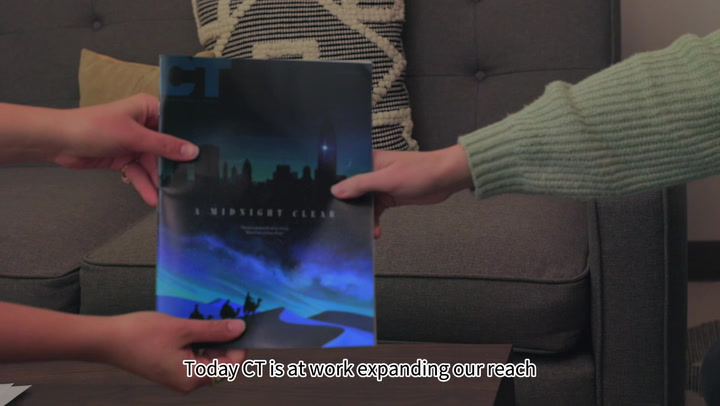
Will you help encourage and connect the church?
Give NowWill you help encourage and connect the church?
Give NowFred Smith wasn't trying for an award when he first started writing about the strange biblical account of Samson. He was just trying to figure out the best way to convey his message to a room full of fellow church members. As a Sunday School teacher, author of the forthcoming book, Where The Light Divides, and the founder of The Gathering, a community of Christian philanthropists, Fred Smith is used to walking the line between dramatically different audiences. This makes him an ideal writer for Christianity Today, which often seeks to speak to broad swaths of the Christian church.
That Sunday School lesson became a blog. That blog became a Christianity Today article, "A Consecrated Fool." And "A Consecrated Fool," became an Evangelical Press Association Higher Goals award winner for Biblical Exposition.
We spoke to Fred Smith about how his unassuming commentary on Samson came to be.
This piece originally appeared on your blog for The Gathering, where you write on a regular basis. Why give writing such a high priority in your life?
I write pieces like Samson because they are Sunday school lessons. I've taught Sunday school for 30 years, and I learned a long time ago that I need to write things out. It was my way of not going off the side roads.
I just write everything out. For 30 years it's 2,500 words every Sunday.
It's the same reason Thoreau went into the woods. He wanted to live deliberately, and I decided I wanted to think deliberately. I wanted to know what I thought about a number of things that I was simply curious about. The best way for me to understand what I think is to write it out.
So the Samson piece actually started as a Sunday school lesson?
Yes, I really am fascinated with the characters in Scripture, and especially the Old Testament characters.
I don't use commentaries when I teach. I don't particularly want to know what other people think, because it skews what I think. And so I just read it, reread it, reread it, and try to notice things.
The Samson article is a pretty good illustration of my process, which is, "Well now, that's interesting. I never thought about that before."
When you were reading the story of Samson, what was the first thing that struck you as something outside of your experience with the passage?
How much time the angel spent talking to the parents, but how little advice was given.
I just said, "Wow, a third of the story is about the announcement of his birth."
Why is that? Why is it not like Mary or Elizabeth, where we get this really wonderful passage? But there is none of that.
Then you start thinking about the nature of Samson. Typically we're taught to look for the redeeming characteristics, and I couldn't find one.
Do you think the piece turned out differently because you taught the lesson first?
Typically the people in my Sunday school class go out saying "I never thought about it that way before." And sometimes they go out saying "That can't possibly be right, because that just doesn't feel scriptural." So, I get that kind of feedback from people and it starts me rethinking. I'll say, "Well, I need to think more about this one." So I do.
You mentioned the Sunday School lesson was 2,500 words and the article is 800. That's a big difference. How do you decide what to include and what not to include?
An editor friend of mine is always saying "What is it you want to say? And so, I think that's what I do: I say, "Of all of this, what is it I really want to say?" In that piece, I think what I really wanted to say is "This man had no redeeming qualities. This man was a weapon, not a leader. This person did what God intended for him to do, which is destroy a lot of stuff." We just need to learn to live with the conflict.
I have a responsibility to people, not to harangue them, and not to preach a particular interpretation that's right or wrong. That creates a lot of tension, but it also creates a way for people to feel safe. I want to create a place where it's safe for people to say "I never thought about it that way before, but I'm willing to."
It seems like your time as a Sunday School teacher has an impact on your ability to write for a broader audience.
At the end of the day that's all I am: a Sunday school teacher. If they put that on my tombstone, I'm a happy guy.
I write mostly out of Scripture, and the principles that I live by probably come from that. That's the source. There are times when I wish it were bigger and deeper and wider than that. But that's who I am.
I call it fly fishing. Howell Raines wrote a book, Fly Fishing Your Way through a Mid-Life Crisis. He says it's a five pound fish on a two pound line and there's this kind of grace, release, and surrender in fly fishing, until eventually over time they come to the same place. It's catch and release, and that's my image for writing or teaching.
There's this tension in the piece between how we relate to the Samsons in our world, or the consecrated fools in our world, and facing the reality that we're consecrated fools ourselves.
I'm 73 years old, and I find it a lot easier to deal with the fallenness of human nature, and the possibility of being a consecrated fool. When I was young there was no possibility of being a consecrated fool. That was an oxymoron. You were either pure or impure.
I guess is just obvious. He really is a fool. He's the ultimate fool. And he really is consecrated.
I really am happy the end of the day if somebody does say "I feel like I have permission to rethink something."
But not to say, "Oh I agree with you." That doesn't motivate me at all.
Why do you write for CT?
Former CT CEO Harold Myra had this wonderful phrase. He talked about CT being irenic. You can't be quite as irenic as Harold was in his day and age. I mean you've got to be a little bit edgy and snarky and a little more out there.
Whenever we have done surveys of what people in The Gathering read, CT has been in the top four publications along with Forbes and the Wall Street Journal. CT readers are discriminating readers, and not looking for articles that confirm their own bias or stir up their outrage. They are looking for a certain measured perspective and have come to expect that from CT.
I respect CT because it is not captive to any particular camp. For someone like me with a little more eclectic approach, that makes writing for CT easier-knowing you don't have to come down on a particular conclusion. Your work will be judged by the quality and not by adherence to foregone conclusions.
I would say CT is a friendly place to write, and I consider CT a friend.
Richard Clark is branded content & partnerships manager at Christianity Today








